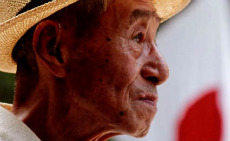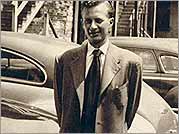Date: Tuesday, 5 October 2010
Time: 8:00 PM
Location: White Lecture Hall, East Campus (map and directions)
Contact Information: Kirston Johnson, 919-681-7963 or kirston.johnson(at)duke.edu
Cine-East: East Asian Cinema and Screen/Society present The Ants (Ari no Heitai), winner of the Humanitarian Award (Documentary) at the 2006 Hong Kong International Film Awards. Kaoru Ikeya’s documentary tells the story of Waichi Okumura, one of over one thousand Japanese soldiers (the “ants” of the title) to remain in China after the conclusion of World War II, ostensibly to “incubate new military cells” but really to be used by the Chinese Nationalists in the battle against Mao’s forces.
This special presentation is made possible by the Full Frame Archive, part of the RBMSCL’s Archive of Documentary Arts, and will be introduced by Tanya Lee, Full Frame Archive intern.
The Asian/Pacific Studies Institute, the Program in the Arts of the Moving Image, and the Department of Asian and Middle Eastern Studies are co-sponsors of the screening.












